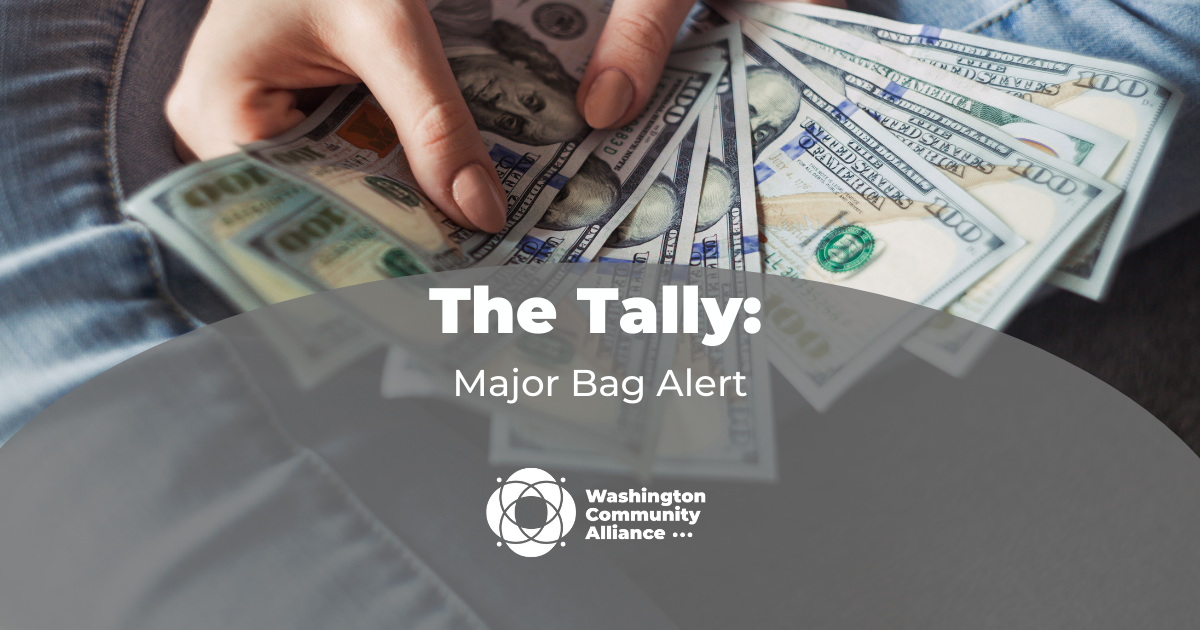
Friends —
Well, let’s just say, called iiiit. The Senate and House dropped their budget proposals this week, with a wild turn-around time to comment on them, so there is MUCH to discuss. Heads up: The next looming deadline, Monday the 28th, is when bills have to pass out of the opposite-Chamber’s committees, including the Senate financial (Ways & Means) and Transportation Committees! [Since they’re not included in the first few session deadlines.]
📊 Budget Breakdowns 🧾
Before we delve into breaking down the budget proposals, we can’t ignore the built-in gatekeeping our typical legislative processes create. The legislature restricts community input and side-steps transparency.
Just an example of one of the many ways they do this: The budgets dropped Monday morning and everyone had to analyze thousands of pages to then show up to provide testimony on them within a day. That’s unacceptable. The legislature sets these dates, deadlines, cut-offs, and turn-arounds every year—and even violates their own rules pretty frequently! It doesn’t have to be like this. Short legislative sessions, by their nature, make less effective and less equitable processes and policies, period.
There’s also just bigger, economic problems working people face that budgets don’t address. By and large, budgets tend to fix surface-level issues. If and when they do, a lot of it is reactionary to our problems rather than preventive. Plus, year over year, our own state invests less in itself (made up this year only through federal funds). That’s not sustainable.
The few of many unmet priorities, for example: No guaranteed basic income in the budgets right now—not even for a pilot; No home weatherization; No backfill for the Federal Child Tax Credit ending. The latter means tens of thousands of our state’s children will be pushed back into poverty.
Our legislature isn’t even trying to address the structural issue of child poverty. Instead, it’s focused on limiting itself under the excuse of a short session. Yes, efforts like providing diapers and breast milk deserve applause, but they’re still downstream from the real issue and the big solutions. [‘Sup, universal child benefits!] We still have a significant amount of funds left unused from last year’s federal stimulus, and keep moving millions of funds into already-billions reserves instead of actually using the reserves when we need them.
The biggest increase in this year’s budget is economic security, but that doesn’t mean it takes up the most of the budget (it’s just over $1 billion—both budgets literally give twice as much prisons, AKA the Department of Corrections, than that). For some reason, the state legislature is also planning to remove maintenance funds from public schools, so that’s only horrifying.
What both budgets do
More funding for the Working Families Tax Credit! Pretty decent investments in affordable housing, childcare, and support for people living with disabilities!
Both budgets unfortunately provide over $2 billion to the Department of Corrections—to what extent that’s pensions, wages, or what we are unsure but will let you know.
While where it goes is different, both Chambers put about $2 billion into the transportation budget.
What both budgets don’t do
They don’t replace the federal COVID recovery funds that are set to expire in 2024.
They don’t change our backwards tax system. Lawmakers should approve permanent, equitable sources of revenue, such as a new tax on billionaires. Even with higher projected tax collections in the coming years, state tax resources remain at near historic lows. And while the recently-enacted capital gains will bring greater equity to Washington’s notoriously upside-down tax code, the richest residents will continue to get a very special tax deal—one that comes at the expense of everyone else.
In ONLY the House Budget (not the Senate)
Thankfully, the House set aside $5.4 million specifically for the implementation of HB 1099 (climate mitigation and resiliency in land use planning). The bill hasn’t exactly gone though the Senate yet, though, which is why it’s not in their budget right now. Even the Governor’s Budget also included funding for HB 1099!
The House Budget also puts in funds for some pretty cool things:
- cost of living adjustments for teachers
- hazard pay increases for nursing home care workers
- giving 92,000 more kids access to free school meals
- pilots for wealth inequities in Washington state
- $500 million for the Housing Trust Fund, rapid acquisition, and supportive housing
- $78 million to support housing and homelessness frontline service workers
But, of course, we have to harp on something (and ngl it’s a pretty big something👀):
The House budget wastes nearly $200 million on a three-day sales tax cut, which they’re calling a “holiday”. Experience in other states shows that such “sales tax holidays” just create more money for retailers and the wealthy while draining resources for schools and other priorities. This won’t help low-income families who might be buying food or lack disposable income. Washington’s most struggling residents will not see benefits from this tax break.
In ONLY the Senate Budget (not the House)
Happy to announce there’s $89,000 to fund the Washington Voting Rights Act (WVRA) bill in the Senate budget! Relatedly, there is a need, next biennium, for $7 million to the Attorney General’s Office. Similar to HB 1099’s funding situation, there’s no line item in the House’s budget on the WVRA because the bill is only just now going through the House.
Truly, there’s been less excitement around the Senate budget than the House. So that’s all for now, folks!
What do you think? Have any questions? Tweet us your thoughts @wacommalliance. Keep up with the action and opportunities to get involved with our legislative newsletter The Tally.

